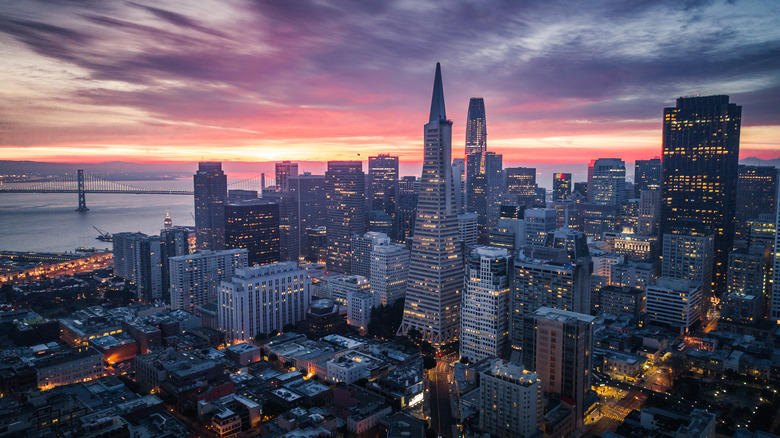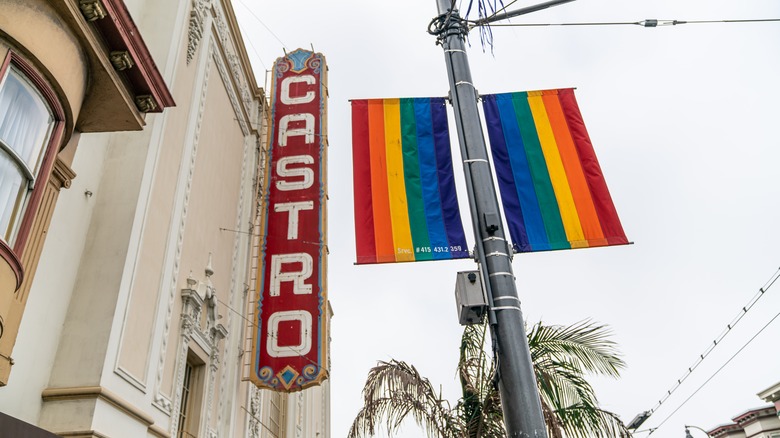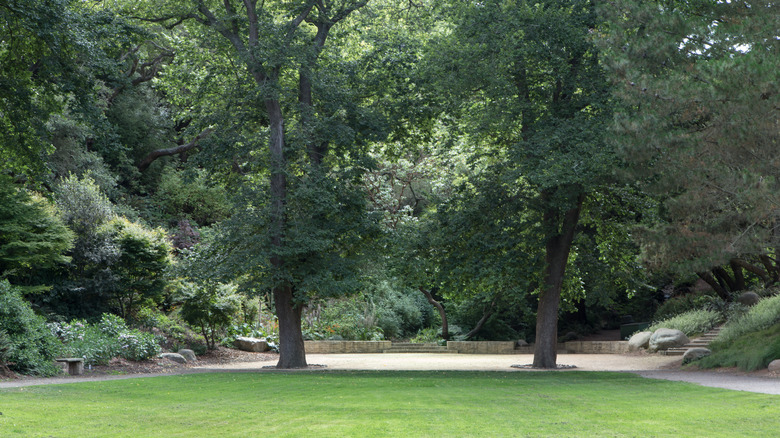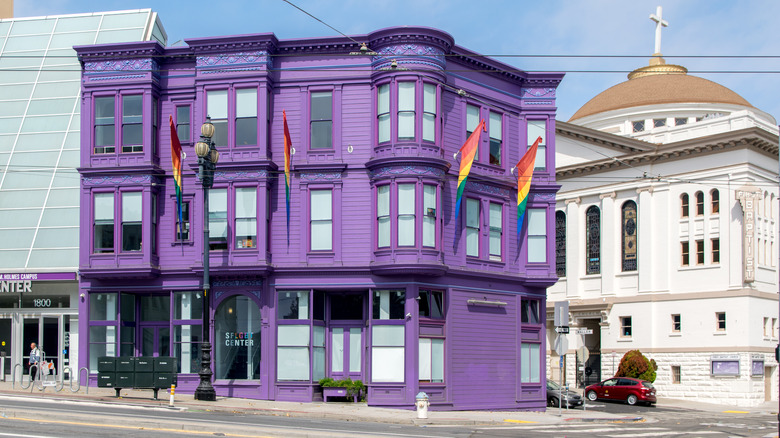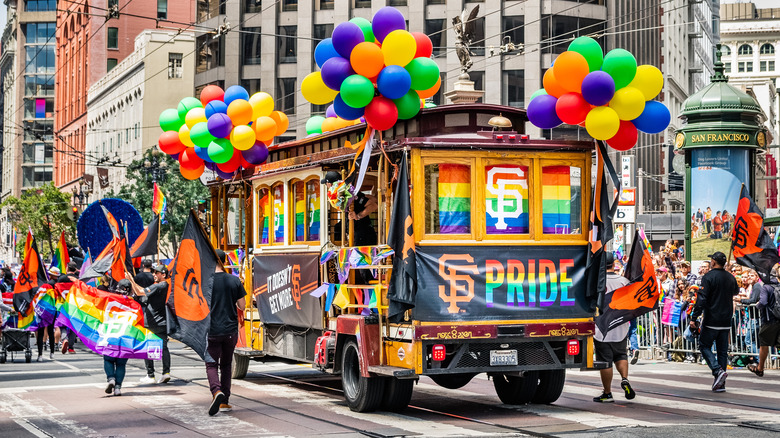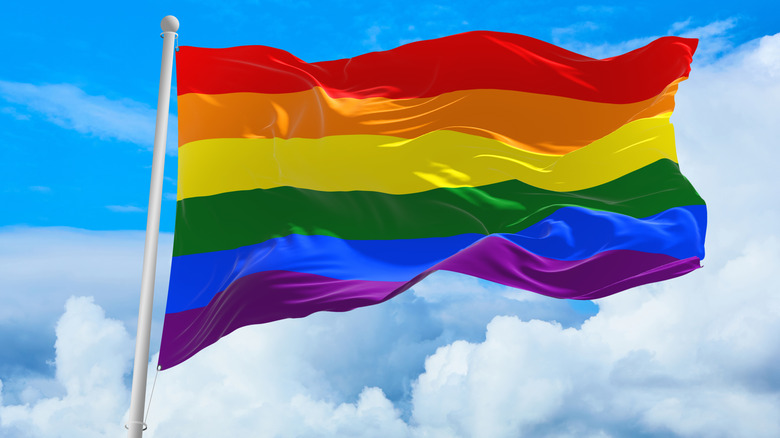The Best City To Live In In America If You're LGBTQ
According to Gallup, 7.1% of Americans currently identify as LGBTQ, a new high and twice as many as were recorded in its initial survey. For them, discrimination and violence are facts of life, and many cities close their doors and shut their hearts to the gay community. One notable exception is San Francisco, which wins the prize as America's best city to live in if you are LGBTQ, and it may arguably also be the gayest. Per San Francisco, the city was dubbed "The Gay Capital of America" by "Life Magazine" in 1964. This cosmopolitan metropolis, population 815,201, has come a long way from its humble origins as the Mexican hamlet of Yerba Buena.
In the opinion of Matador Network, the seeds of San Francisco's exalted homosexual status germinated during the Gold Rush of the 1840s when nearly 95% of its population was male. During World War II, the U.S. Army was an unwitting queer catalyst. While discharging suspected homosexuals, it also published lists of off-limits establishments that ironically surged in popularity.
A great and gay city
The Castro is the most gay-friendly neighborhood in San Francisco, America's gayest city. Once a working-class Irish enclave, its residents gradually moved up the economic ladder and into the suburbs. They were replaced by a group drawn to the district's reasonable prices and Victorian architecture. Many were gay, and according to Fodor's Travel, there were more than 60 bars catering to LGBTQ newcomers in just a few years. Even the crosswalks are rainbow-colored in the Castro. You'll find the GLBT Historical Society, the "Queer Smithsonian" here, and the glitzy 1920s-era Castro Theatre. Martyr Harvey Milk, the first openly gay politician, founded the now-annual Castro Street Fair. Furthermore, Gilbert Baker, the designer of the Rainbow Flag, is honored with his own pennant in the district.
Among its many tourist attractions, regardless of orientation, are Fisherman's Wharf, Haight-Ashbury, the Golden Gate Bridge, and ethnic neighborhoods Chinatown, Japantown, Little Saigon, and Little Italy. Alcatraz Island, North Beach, and nearby Yosemite National Park are standouts, as are the neighboring redwoods and Sonoma and Napa Valley vineyards. The city's restaurant scene is renowned among foodies. In addition to its accepting and incomparably inclusive natives, San Francisco is also home to the tech upper crust of Silicon Valley. TripSavvy touts the city as an ideal gaycation spot.
San Francisco gay landmarks
As befits a pro-LGBTQ stronghold, San Francisco is rife with gay landmarks. The National AIDS Memorial Grove is in Golden Gate Park, on Nancy Pelosi Drive. Another contemplative spot is Pink Triangle Park and Memorial, whose granite pylons commemorate the gay victims of the Holocaust. The Guardian described Compton Cafeteria as the scene of a pre-Stonewall transgender riot directed against police harassment. Star Pharmacy posted the first warnings concerning a "gay cancer" (AIDS) that was beginning to decimate the community while being ignored by the government. Another city landmark is Castro Camera. Operated by Harvey Milk, who also lived above it, the store was a gay community hub and Milk's election headquarters. Per Curbed San Francisco, no longer in business, is the one and only Barbra Streisand Museum.
El Rio is a lesbian hotspot in the Mission District, and Jolene's is another ladies' favorite. Hamburger Mary's offers diner food, drinks, and drag shows. Across the bay in Oakland is the White Horse. Operating since 1933, it is one of the nation's most venerable gay bars. Other queer-friendly spots include sports bar Hi Tops, which always draws a crowd, and Baker Beach appreciated locally for its gay and clothing-optional crowd. Does Your Mother Know is San Francisco's largest gay adult gift store. Entertainment and San Francisco go hand in hand. The San Francisco International LBGTQ+ Film Festival is a popular event. Another annual gathering is the Fresh Meat Festival, featuring trans and queer performances.
Queer-friendly resources
Queer In The World describes the purple-painted San Francisco LGBT Center as a gay beacon for the last 20 years. The National Center for Lesbian Rights and the Latinx-centric Mission Neighborhood Health Center offer free services and resources. The San Francisco City Clinic dispenses health services for the entire LGBTQ community. Episcopalian Grace Cathedral, Metropolitan Community Church, and the Catholic Ministry of Courage also serve the spiritual needs of the LGBTQ community. Sha'ar Zahar has been the city's gay and lesbian synagogue since 1977. During the AIDS crisis, Holy Redeemer Catholic Church rose to the occasion and continues as a resource. Hartford Street Zen Center also provides support to LGBTQ residents. According to the County of San Mateo, The Asian Women's Shelter-Queer Asian Women & Transgender Support organization is one of the nation's few to address domestic violence in those communities. San Francisco has remained at the forefront of AIDS research and prevention.
Per American Legal Publishing, as codified in the San Francisco charter, the city rejects bias against the LGBTQ community. San Francisco espouses equal treatment, and it forbids paying tax revenue to discriminatory entities. The administration code protects gender identity, orientation, same-sex couples, and families. Recent zoning change rules also permit gay bathhouses to re-open in strongly LGBTQ neighborhoods.
San Francisco gay miscellany
Per the San Francisco Chronicle, fewer-than-average murders and assaults occur in the city. Hate crimes, unfortunately, have risen dramatically, with an almost 50% increase in incidents directed against LGBTQ+ people in the most recent full year, according to the Bay Area Reporter. Legislation defending gays and lesbians has therefore become more crucial than ever. According to NBC News, states enacted 238 anti-LGBTQ bills in just the first three months of 2022, and nearly 50% targeted transgender individuals.
San Francisco's history is infused with LGBTQ milestones. The city's first gay bar, The Dash, started in 1908. The doors to SF's initial lesbian bar opened 26 years later, and Twin Peaks Tavern became the first gay bar to operate openly. The Daughters of Bilitis, the U.S.'s first lesbian organization, was established in San Francisco in 1955. Its co-founders were issued the first same-sex marriage licenses after the decision in Obergefell v. Hodges allowed it. The initial transgender organization also started there in 1966. The Gay Freedom Day Parade was inaugurated four years later, along with the first "Gay In." According to Two Bad Tourists, it has become the ultimate queer gathering, with hundreds of thousands of participants. The occasion is marked by an enormous pink triangle draped on nearby peaks.
The gayest city of all
UCLA's Williams Institute School of Law reveals that San Francisco has the highest percentage (6.7 %) of gays in any comparable metropolis. Per Gay City News, its rate of same-sex couples is 2.8%, also tops in the nation. Portland, Oregon, is the surprising runner-up in both categories. San Francisco's hotels are gay-friendly and universally accepted; many actively seek LGBTQ customers. A small army of gay realtors makes the real estate process as easy as possible for queer clientele.
For all of its attributes, San Francisco has one minus, and it is a big one: Its extreme lack of affordability. According to RentCafe, housing costs are a crippling 238% higher than the nation's average. This translates to median prices exceeding $1.4 million to purchase a home, with monthly rents averaging a barely affordable $3,340. San Francisco scored 100 regarding inclusion from the Human Rights Campaign and Equality Federation Institute. Spotlighted by Armistead Maupin in his novels "Tales of the City," and further popularized by the subsequent miniseries, San Francisco continues to proudly wear the crown of the country's most LGBTQ+-friendly city. The effect on the city of an upcoming antagonistic Republican House majority remains to be seen.
